 Photo: proza.ru
Photo: proza.ru
In the name of the Father and the Son and the Holy Spirit!
The Holy Church concludes its guidance as we pass through the great school of Lent, pointing us to the examples of two great ascetics whom we should imitate: Sts. 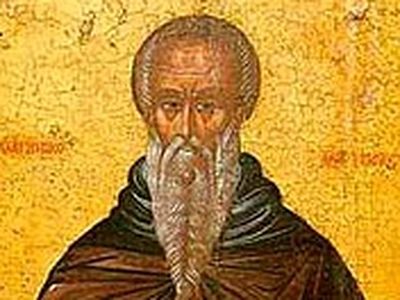 St. John of the Ladder (Climacus)It is known from St. John’s life that he ate what was allowed by the rule of fasting, but within measure. He did not go without sleep at night, although he never slept more than was needed to support his strength for ceaseless vigilance, and so as not to negatively affect his mind. ”I did not fast beyond measure,” he said of himself, ”and I did not conduct intensified night vigil, nor did I sleep on the ground; but I humbled myself…, and the Lord speedily saved me.
St. John of the Ladder (Climacus)It is known from St. John’s life that he ate what was allowed by the rule of fasting, but within measure. He did not go without sleep at night, although he never slept more than was needed to support his strength for ceaseless vigilance, and so as not to negatively affect his mind. ”I did not fast beyond measure,” he said of himself, ”and I did not conduct intensified night vigil, nor did I sleep on the ground; but I humbled myself…, and the Lord speedily saved me.
“>John of Climacus and 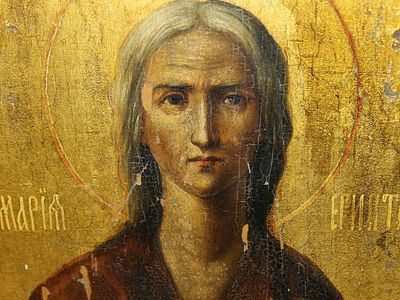 St. Mary of Egypt. A Homily by St. Tikhon, Patriarch of MoscowThe life of St. Mary teaches us that there is no sin that could overcome the mercy of God, there is no abyss of dissoluteness that we could not rise from by the grace of God and by taking the path of faith and repentance.”>Mary of Egypt. Nevertheless, on the last Sunday, the Church also reminds us of another necessary condition for spiritual labor.
St. Mary of Egypt. A Homily by St. Tikhon, Patriarch of MoscowThe life of St. Mary teaches us that there is no sin that could overcome the mercy of God, there is no abyss of dissoluteness that we could not rise from by the grace of God and by taking the path of faith and repentance.”>Mary of Egypt. Nevertheless, on the last Sunday, the Church also reminds us of another necessary condition for spiritual labor.
You heard in today’s Gospel reading how Christ, on the path to Jerusalem, told His disciples: The Son of Man shall be delivered unto the chief priests, and unto the scribes… And they shall mock Him, and shall scourge Him, and shall spit upon Him, and shall kill Him (Mk. 10:33-34). And the disciples were amazed; and as they followed, they were afraid (Mk. 10:32).
But when they heard about the Resurrection, the Sons of Zebedee came to Him and said: Master, we would that Thou shouldest do for us whatsoever we shall desire. And He said unto them, What would ye that I should do for you? They said unto Him, Grant unto us that we may sit, one on Thy right hand, and the other on Thy left hand, in Thy glory. After He told them that it was not given to them, but to them for whom it is prepared, the other disciples, hearing the request of the Son of Zebedee, were indignant, and the Lord called them all and said: Ye know that they which are accounted to rule over the Gentiles exercise lordship over them; and their great ones exercise authority upon them. But so shall it not be among you: but whosoever will be great among you, shall be your minister: And whosoever of you will be the chiefest, shall be servant of all. For even the Son of Man came not to be ministered unto, but to minister, and to give His life a ransom for many (Mk. 10:35-35).
This Gospel narrative includes one of the necessary conditions that ensures that the path offered to us by the Church in these days not be in vain (the other I tried to reveal during Lent as much as I could). The Lord, in coming to earth, came to serve us: For even the Son of Man came not to be ministered unto, but to minister, and to give His life a ransom for many (Mk. 10:45).
And the Lord calls us to learn from Him: Learn of Me; for I am meek and lowly in heart (Mt. 11:29).
“Learn this humility, for you are ruled by the prince of this world, and the best of you—the Apostles James and John—are overcome by vanity and pride.”
And so, on this day, the Holy Fathers have appointed the reading of this Gospel, which provides us with the necessary conditions for our spiritual work.
After all, one can follow the path indicated by Sts. John Climacus and Mary of Egypt and in the end still fall into great pride. Warning us against this, the Holy Fathers point us to the example of the Lord and the disciples.
“For God is manifested not in labours but in simplicity and humility,” says St. John Climacus (Ladder of Divine Ascent 26.52).1 Only he who walks the path of humility can receive gifts.
So, we are called to walk the path of humility. But what is humility? Let us turn to the one whom the Church gives us as a teacher during Great Lent.
It [humility] is of a quality that baffles all description. This treasure has an inscription, which is incomprehensible because it comes from above, and those who try to explain it with words give themselves great and endless trouble. And the inscription runs thus: Holy Humility.
Let all who are led by the Spirit of God enter with us into this spiritual and wise assembly, holding in their spiritual hands the God-inscribed tablets of knowledge. We have come together, we have investigated, and we have probed the meaning of this precious inscription. And one said: “It means constant oblivion of one’s achievements.” Another: “It is the acknowledgement of oneself as the last of all and the greatest sinner of all.” And another: “The mind’s recognition of one’s weakness and impotence.” Another again: “In fits of rage, it means to forestall one’s neighbour and be first to stop the quarrel.” And again another: “Recognition of Divine grace and Divine compassion.” And again another: “The feeling of a contrite soul, and the renunciation of one’s own will.” But when I had listened to all this and had attentively and soberly investigated it, I found that I had not been able to attain to the blessed perception of that virtue from what had been said. Therefore, last of all, having gathered what fell from the lips of those learned and blessed fathers as a dog gathers the crumbs that fall from the table, I too gave my definition of it and said: “Humility is a nameless grace in the soul, its name known only to those who have learned it by experience. It is unspeakable wealth, a name and gift from God, for it is said: Learn not from an angel, nor from man, nor from a book, but from Me, that is, from My indwelling, from My illumination and action in you; for I am meek and humble in heart and in thought and in spirit, and your souls shall find rest from conflicts and relief from thoughts” (cf. Mt. 11:29) (25.2-3).
Thus, we should learn humility not from angels, not from men, not from the great books of the Gospel, but from Christ Himself, for He calls us to this. “Humility is Christ’s spiritual doctrine, noetically introduced into the inner chamber of the soul by those who are counted worthy of it. It cannot be defined by perceptible words” (25.41).
So how can we know anything about humility now in the sense of one understanding of it or another? The Holy Fathers say that we can know humility not by its essence, but by its action.
“We cannot describe the power and essence of this sun, humility, but from its properties and effects we can explain its intrinsic nature” (25.25).
“Humility is a Divine shelter to prevent us from seeing our achievements” (25.26).
The humble man does not see his achievements, but only his sins. There is a veil covering over his achievements.
How can we check whether we have humility or not?
St. John of Climacus says that, “Most of us call ourselves sinners, and perhaps really think it; but it is indignity that tests the heart” (25.33).
“It is not he who disparages himself who shows humility (for who will not put up with himself?), but he who maintains the same love for the very man who reproaches him” (22.17).
Here is the sign that can reveal the state of a soul regarding humility:
“A sign of the deepest humility will be to abase ourselves by pretending to have faults that we do not possess” (25.44).
If we not only tolerate humiliation, but consider ourselves worthy of it, then we will have humility.
The Lord says that humility must be learned from Him: For I am meek and lowly in heart (Mt. 11:29). Jesus Christ came to earth in order to “raise up the image of the fallen forefather”—fallen because man fell due to his pride.
The Lord came, taking the form of a slave in everything save sin, becoming like us—He humbled Himself, humbled Himself to death, and became obedient unto death, even the death of the Cross (Phil. 2:8).
He constantly testifies to His disciples that He came not to fulfill His own will, but the will of the Father, and in the Garden of Gethsemane He prays: Father, if Thou be willing, remove this cup from Me: nevertheless not My will, but Thine, be done (Lk. 22:42).
And in the prayer that the Lord gave us, He teaches us to say: Thy will be done. He Himself gave us a great example of what kind of attitude to have towards the will of God; He showed that our actions are based on this.
We must do the will of God, and to do it, we must know what it is.
This knowledge is acquired by discernment, for “discernment is, and is recognized as, the certain understanding of the Divine will on all occasions, in every place and in all matters” (26.1). But it’s given to those who are already on the path of labor, who are ascending the path of humility. We must follow the path of obedience, the path that St. Mary of Egypt walked, having surrendered her will to that of her Faithful Guardian.
What do obedience and humility have in common?
This is what St. John Climacus says:
I once asked one of the most experienced fathers, and pressed him to tell me how humility is obtained by obedience. He said: “The obedient man who has discernment, even if he raises the dead and receives the gift of tears and freedom from conflict, will still think that it is the prayer of his spiritual father that has done it, and he remains foreign and alien to vain presumption. For how could he possibly pride himself on what is done, as he himself admits, by the help of his father, and not by his own effort?” (4.55).
Thus, an obedient man is one who constantly attributes what he has in terms of certain achievements to his guide. You know from the life of St. Mary of Egypt that she considered all her spiritual deeds as a gift from the Mother of God.
This is the condition that helps us in the struggle to acquire humility, and we have to remember that it’s not according to our merits that the Lord gives us certain gifts. We receive humility according to the degree that we struggle against pride.
“By the ineffable providence of God, some have received holy returns for their toiling before their labours, some during their labours, some after labours, and some at the time of their death. It is a question which of them was rendered more humble?” (26.88).
And so, St. John Climacus says that the Lord gives spiritual gifts according to the extent of our humility, so we must fight for humility; we have to remember that everything that the holy Church taught us in the days of Great Lent will serve for our salvation only if we have humility as our foundation; for we know that it’s possible to fall from Heaven, but David was pardoned for humility alone: I was brought low and He saved me (Ps. 114:6).
“If the pride of some of the angels made them demons, no doubt humility can make angels out of demons. Wherefore, let those who have fallen take courage!” (25.63).2
So, all of us who are fallen, all of us who have come to God in repentance, and who yesterday called out for the last time: “Open to me the doors of repentance, O Lifegiver,” must remember that no labors, no spiritual feats will help us if we don’t walk the path of humility.
Therefore, the Gospel that’s appointed for us to read today gives us that foundation without which our labors are in vain.
Yes, we need to know what can ruin us. It’s only in humility that we can receive a reward and a crown from Christ.
When we come to the Dread Judgment, the Lord won’t demand gifts from us, but only humility. He’ll ask us whether we learned humility from Him.
“Many,” says St. John Climacus, “have received salvation without prophecies and revelations, without signs and wonders; but without humility no one will enter the marriage chamber” (25.52).
When we receive prayer from God, or the ineffable joy of loving people, we consider it our own property; we don’t consider that the Lord gave us this gift, but that it’s our acquisition, and we start condemning others and exposing ourselves, and then, through pride, our gift is exhausted and destroyed.
We have to remember that the Church calls us along the path of prayer and the Sacraments, through illumination by the light of Tabor, through bearing the cross and imitating the saints.
We must remember that we can learn humility by reading the Holy Fathers, for reading those who knew what humility is, although they couldn’t express it in words, their soul is evident in their writings. And then, let those near to us be our teachers of humility, for they know our wounds better than we do. Let us be attentive to those who reveal our shortcomings to us, and take their instructions as God’s instructions. They reveal our transgression to us; they humble us. And if someone says something to us in vain, it brings us into communion with the Lord, Who was wounded for our transgressions [and] bruised for our iniquities (Is. 53:5). Those who want to walk the path of ascent must constantly remember that it’s not only necessary to walk it, but to always bear in mind that our efforts may prove to be in vain if humility isn’t acquired.
Let us learn from Him Who came to raise us to Heaven and Himself ascended there in glory, and only under this condition will our spiritual labor have a crown, which is received by those who have striven well on earth.
It’s not in vain that the Church now gives us the image of these two disciples—the Sons of Zebedee, who were infected with pride and vanity and incited the other Apostles. And the Lord instructs not only them, but all of us, that whoever wants to be first must be the servant of all.
This is the covenant that Christ gives us; this is what it means to walk the path of humility; these are our examples for learning humility.
Thy will be done—this must not only be our prayer, but also our work.
Blessed are the poor in spirit: for theirs is the Kingdom of Heaven (Mt. 5:3), but not only those who labor in caves, deserts, and abysses of the earth, but also all those who commit their every deed in humility—they will enter the Kingdom of Heaven, while others will be cast out.
Let us remember that without fulfilling this covenant, not a single virtue will serve unto salvation, and that in fulfilling it, we mustn’t be proud of our gifts.
Amen.
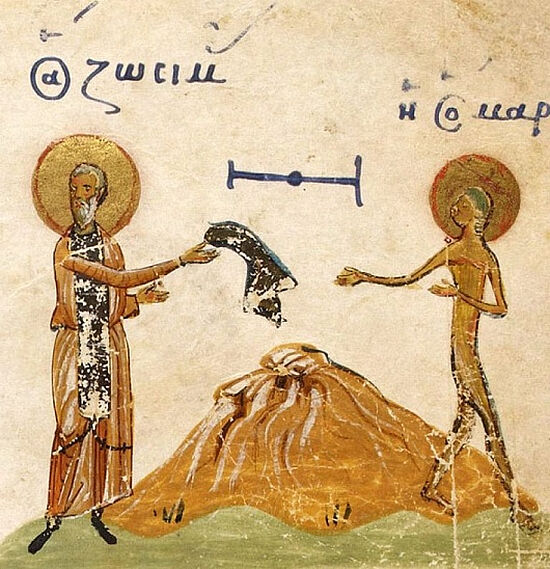
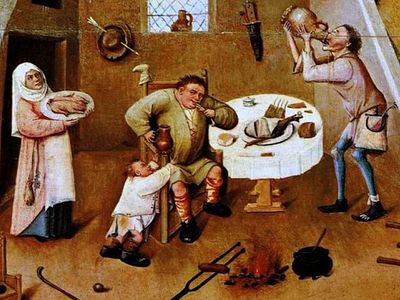 On Cutting Off TemptationsDainty foods and naked bodies have become idols of our days, and gluttony and viewing erotic images can be compared to idol-worship. How can we deprive ourselves of temptations?
On Cutting Off TemptationsDainty foods and naked bodies have become idols of our days, and gluttony and viewing erotic images can be compared to idol-worship. How can we deprive ourselves of temptations? Fasting for Non-MonasticsA curious phenomenon can be observed in the interactions between pastors and their parishioners at the beginning of each major fast of the Church. Pastors attempt to call their parishioners’ pious attention to the spiritual heights of fasting: the fighting against sin, the conquering of passions, the taming of the tongue, the cultivation of virtues. In turn, parishioners pester their pastors with purely dietary questions…”>Fasting, lying prostrate, and the heat and cold exhausted her. And here are two powerful ways that she withstood and overcame sin: departing from the world and the exhaustion of the flesh.
Fasting for Non-MonasticsA curious phenomenon can be observed in the interactions between pastors and their parishioners at the beginning of each major fast of the Church. Pastors attempt to call their parishioners’ pious attention to the spiritual heights of fasting: the fighting against sin, the conquering of passions, the taming of the tongue, the cultivation of virtues. In turn, parishioners pester their pastors with purely dietary questions…”>Fasting, lying prostrate, and the heat and cold exhausted her. And here are two powerful ways that she withstood and overcame sin: departing from the world and the exhaustion of the flesh.  The Way of Christ’s CommandmentsThe dignity and nobility of man is not so much in the privileges he received from his ancestors as in those good qualities of the soul that he acquired by working on himself.
The Way of Christ’s CommandmentsThe dignity and nobility of man is not so much in the privileges he received from his ancestors as in those good qualities of the soul that he acquired by working on himself.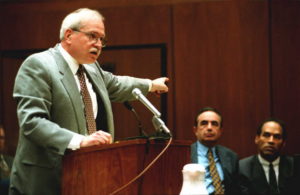
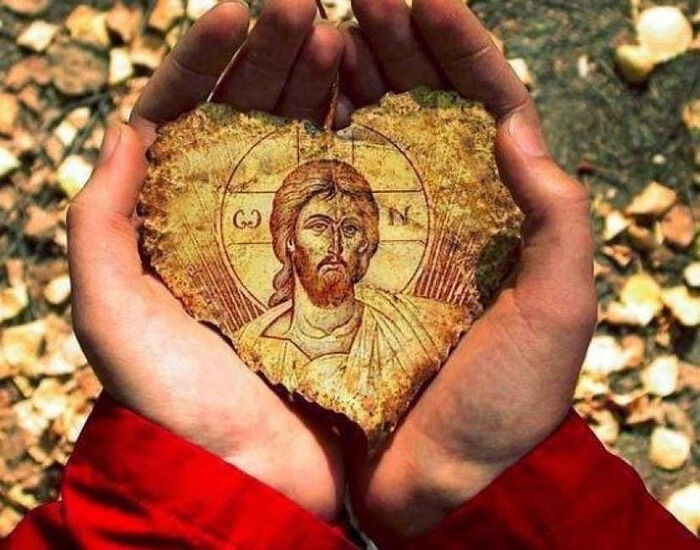
 St. John of KronstadtSt. John of Kronstadt
St. John of KronstadtSt. John of Kronstadt